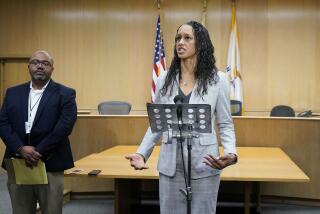E-mails to Steve Jobs get replies -- from Steve Jobs!
- Share via
It took just one word for Apple Inc. to make headlines.
“Yep,” wrote Apple chief Steve Jobs in an e-mail.
The message was addressed to Andrea Nepori, an Italian blogger who wrote to sjobs@apple.com this week. He asked the reclusive Apple founder whether he’d be able to sync his free e-books to the iPad, due to hit U.S. stores next week.
Jobs’ affirmation wasn’t the real news. That particular detail was listed on Apple’s website before Nepori’s inquiry. The response itself is what prompted bloggers to fly off the handle.
The 55-year-old Apple co-founder has something of a rock star status among technology fans. So the prospect of receiving a response from him -- or someone with access to his e-mail in box -- sparked excitement.
“I wasn’t expecting that,” Nepori said.
Neither Jobs nor Apple responded to e-mails seeking comment. Apple’s public relations department is notorious among journalists for its tight-lipped nature and precise statements. But the company has always found other ways to get its message out.
Apple has had monumental success in the last few years drumming up interest -- be it with clever “Mac vs. PC” ads, dancing silhouettes or semi-exclusive press events. The cult of Mac eats it up, and so do the media and the blogosphere.
Talking briefly before a product announcement last summer at the Apple Worldwide Developers Conference in San Francisco, a developer on the QuickTime video software team, surveying the throngs of reporters at Moscone Center, said: “It’s great. We get plenty of free advertising.”
A personal e-mail is certainly an unusual way for a chief executive to broadcast his message.
Marketing analyst Rana Sobhany, who is working on a book about Apple, points out that Jobs’ messages to customers, which have ramped up this week, are characteristically simple. He selectively chooses the questions he wants to address in an always concise and calculated manner.
Software developer John Devor received an e-mail reply from Jobs in November. The founder of the Little App Factory had received a legal warning about the name of its iPodRip program, which referenced Apple’s trademarked music player.
Devor sent e-mails to Jobs, to Apple co-founder (and “Dancing With the Stars” contestant) Steve Wozniak and to Phil Schiller, Apple’s senior vice president of worldwide marketing. He received responses from the two co-founders. Wozniak’s was several thoughtful paragraphs long.
Jobs’ response, however, was terse. He wrote: “Change your apps name. Not that big of a deal. Steve.”
“I didn’t know what to think because it was really brief,” Devor said. “I don’t really blame him. He’s got a lot of things on his plate.”
Like many personal e-mails Jobs sends, this one made the rounds on numerous blogs. Many expressed support for Devor because of Jobs’ less-than-compassionate tone, Devor said.
But Jobs was right. “It actually didn’t turn out to be a big deal,” Devor said. “It actually ended up helping us because we got so much press.”
Devor, a senior at the University of Virginia, printed a copy of Jobs’ e-mail and hung it in his apartment.
Jobs’ recent burst of personal e-mails has appeared to surprise even his own employees. Frode Ersfjord of Norway wrote to Jobs regarding a persistent problem with the display of his iMac computer.
Jobs’ response: “This problem is behind us.”
“An hour later a woman from Apple called me,” Ersfjord told The Times in an e-mail. “She was giggling and obviously found the whole thing rather entertaining and maybe a bit unusual.”
Robert Mozayeni, 14, received an e-mail from his idol this week. He asked Jobs whether he’d be able to easily migrate his documents from Google Inc.’s Google Docs to Apple’s iWork application.
Jobs replied, “Yes,” and his signature indicated the message was sent from an iPad.
“I’ve been sending letters to Steve Jobs for a while,” Mozayeni told The Times in an e-mail. “I sent him some letters when I was around 9 and once or twice when I was 12.”
“It was one of the most exciting things that had ever happened to me,” the Bethesda, Md., student said. “That one word, ‘Yes,’ made me more happy than any other occurrence in my life.”






